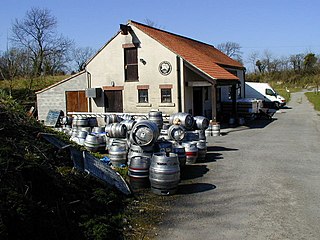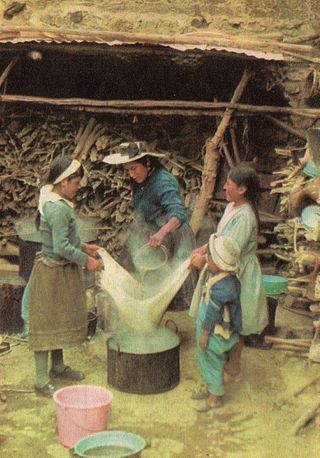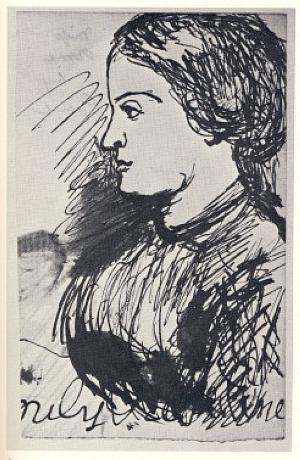
Small beer is a lager or ale that contains a lower amount of alcohol by volume than most others, usually between 0.5% and 2.8%. Sometimes unfiltered and porridge-like, it was a favoured drink in Medieval Europe and colonial North America compared with more expensive beer containing higher levels of alcohol. Small beer was also produced in households for consumption by children and by servants.

Beer has been brewed in England for thousands of years. As a beer brewing country, it is known for top fermented cask beer which finishes maturing in the cellar of the pub rather than at the brewery and is served with only natural carbonation.

John Skelton, also known as John Shelton, possibly born in Diss, Norfolk, was an English poet and tutor to King Henry VIII of England. Skelton died in Westminster and was buried in St. Margaret's Church, although no trace of the tomb remains.

Lucy Hastings, Countess of Huntingdon, born Lucy Davies, was a seventeenth-century English poet. Her poems were not published in her lifetime. She had ten children including Elizabeth and the 7th Theophilus Hastings.

Cropton is a village and civil parish in the Ryedale district of North Yorkshire, England. It is on the border of the North York Moors National Park, 3 miles (5 km) north-west of Pickering.

Mary Scott (1751/52–1793), married name Mary Taylor, was an English poet, born in Milborne Port, Somerset. She wrote The Female Advocate (1774) in defence of women writing.
Maria Abdy, née Smith, also known as Mrs Adby, was an English poet.

The British Poet Laureate is an honorary position appointed by the monarch of the United Kingdom, currently on the advice of the prime minister. The role does not entail any specific duties, but there is an expectation that the holder will write verse for significant national occasions. The origins of the laureateship date back to 1616 when a pension was provided to Ben Jonson, but the first official holder of the position was John Dryden, appointed in 1668 by Charles II. On the death of Alfred, Lord Tennyson, who held the post between November 1850 and October 1892, there was a break of four years as a mark of respect; Tennyson's laureate poems "Ode on the Death of the Duke of Wellington" and "The Charge of the Light Brigade" were particularly cherished by the Victorian public. Four poets, Thomas Gray, Philip Larkin, Samuel Rogers and Walter Scott, turned down the laureateship. Historically appointed for an unfixed term and typically held for life, since 1999, the position is for a term of ten years.
Nationality words link to articles with information on the nation's poetry or literature.

Elizabeth Rayner Belloc was one of the most prominent English feminists and campaigners for women's rights in Victorian times and also a poet, essayist and journalist.
Capacities of brewery casks were formerly measured and standardised according to a specific system of English units. The system was originally based on the ale gallon of 282 cubic inches. In United Kingdom and its colonies, with the adoption of the imperial system in 1824, the units were redefined in terms of the slightly smaller imperial gallon. The older units continued in use in the United States.

An alewife, also brewess or brewster, was a woman who brewed ale for commercial sale. Women have been active in brewing since before the process's industrialisation.

Ale is a type of beer brewed using a warm fermentation method, resulting in a sweet, full-bodied and fruity taste. Historically, the term referred to a drink brewed without hops.

Women have been active in brewing since ancient times. From the earliest evidence of brewing in 7000 BCE, until the commercialization of brewing during industrialization, women were the primary brewers on all inhabited continents. In many cultures, the deities, goddesses and protectors of brewers were female entities who were associated with fertility.

Mary Hardy was an 18th-century English diarist. She depicted commercial and working life in the countryside, being actively engaged in her husband's farming and brewing business. Her 500,000-word record, compiled daily from 1773 to 1809, reveals the exacting, time-pressured nature of pre-mechanised work for the middle and labouring classes.
Agnes Bugge was an English brewer. Bugge is notable because she was a woman brewer in the 15th/16th century.

Emily Rosaline Orme (1835–1915) was a leader of the Edinburgh National Society for Women's Suffrage. She was a noted campaigner for women's suffrage in Scotland.

Emily Augusta Patmore was a British author, Pre-Raphaelite muse and the inspiration for the 1854-1862 poem The Angel in the House.

Frances Maria Cecilia Cowper, sometimes known as Maria Frances, was a religious poet and part of the Madan-Maitland literary coterie.
















